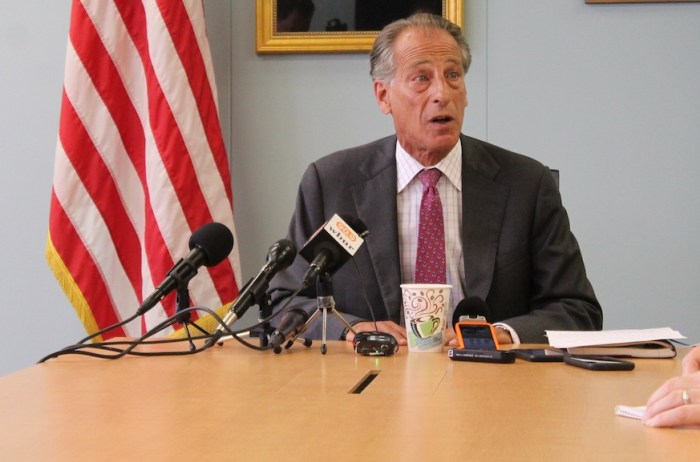The Senate on Thursday night approved a series of updates to the state’s voter-passed marijuana legalization law, which supporters said closely align with the ideals of the ballot question but which differ significantly from the bill House lawmakers passed Wednesday.
The Senate’s 30-5 vote sets up the next stage — a conference committee where three lawmakers from each branch will be appointed to negotiate provisions dealing with taxes, local approval, and other matters. Once the committee agrees on a bill, it is not subject to amendment and would move on to Gov. Charlie Baker’s desk if accepted by each branch.
“We are attempting to respect the will of the voters. Second, we are attempting to reduce the illicit market by promoting a market that will allow consumers access to taxed and regulated products. Third, we are hoping to promote public health and protect consumers,” Sen. Patricia Jehlen, co-chair of the Marijuana Policy Committee, said. “We’re hoping to reduce youth consumption. We’re hoping to remedy the damage to people and communities who have been damaged by the drug war.”
The Senate’s bill (S 2090) does not change the tax rate or structure established in the ballot law passed last November. It calls for a 3.75 percent marijuana excise tax and a local option to levy a tax up to 2 percent in addition to the state’s 6.25 percent sales tax. Depending on the community, the effective tax rate would be between 10 and 12 percent on all marijuana products.
It also maintains the ballot law’s requirement that a municipal ban or limitation on marijuana facilities be approved by a townwide referendum, and provides three versions of the language that a town could put on the ballot. The bill also lays out a process by which municipalities that have voted to ban marijuana facilities can vote to reinstate them in their town.
The Senate also adopted a Sen. Joseph Boncore amendment allowing for expungement of marijuana possession records for offenses that are no longer criminal.
Conference committee members are likely to be appointed Friday, when both the House and Senate have scheduled sessions for 11 a.m.
Jehlen said the bill “implements a strong research agenda to allow us to track marijuana trends, economic trends, elimination of the illicit market, employment, and data on enforcement.”
The House passed its bill (H 3776) — which more than doubled the marijuana tax rate to 28 percent and robbed voters of the right to directly weigh in on marijuana bans in their towns — on Wednesday night.
The Senate’s bill was favored by the marijuana activists who wrote the 2016 ballot law and fought for its passage. The Yes on 4 Coalition, which led the ballot fight with funding from the Marijuana Policy Project, endorsed the Senate legislation.
“They stayed trued to their word that they weren’t going really intrude on the will of the voters and came forward with what we thought was reasonable,” Yes on 4 spokesman Jim Borghesani told the News Service after the vote.
Borghesani said would be difficult to guess what would prevail in conference. On tax rates, he predicted the legislators would settle in the middle, or somewhere between 12 and 28 percent.
“How you compromise on local control, that’s going to be difficult, and if they can’t reach a compromise, it’s going to revert to what happened in November, and that’s what it should do,” he said.
While the House bill repealed the law voters approved in November and replaced it with a new text, the Senate’s bill keeps the skeleton of the ballot law makes targeted amendments to it.
Jehlen, who reluctantly agreed to serve as the Senate’s pot point person, made clear Thursday that her intention in drafting its bill was to stick closely to the law approved by nearly 1.8 million voters last year.
Jehlen detailed how “for many years” Massachusetts residents made clear in polls that they wanted marijuana possession to be decriminalized. The Legislature did nothing and voters took it into their own hands in 2008. In 2012, voters did the same with medical marijuana after state lawmakers again refused to act themselves, she said. Ditto for 2016’s legalization initiative.
“We should amend and improve, that’s what this bill will do. We need to try to restore some trust in government by not overriding the will of the people,” Jehlen said.
Other senators concurred with Jehlen’s assertion that the Senate could restore a modicum of public trust in Beacon Hill if voters see that the laws they enact themselves are respected by their elected officials.
“There are rare instances where the voters of this commonwealth take matters into their own hands and decide to make decisions at the ballot box, and this is one of them,” Senate Minority Leader Bruce Tarr said on the Senate floor Thursday. “And so fidelity to what they have ordained by their vote, Mr. President, I think is critically important.”
Tarr, of Gloucester, ultimately voted against the bill, as did fellow Republican Sens. Patrick O’Connor of Weymouth, Richard Ross of Wrentham and Ryan Fattman of Webster.
Quincy Sen. John Keenan was the lone Democrat to oppose the bill.
“I’m not so sure that there was anything that could have gotten me to the point where I would have been a yes,” Keenan said after the vote. “And that’s not to say that I’m fundamentally opposed to marijuana usage. I think decriminalization, even to a greater extent than what we have would have been a more prudent course and I think ultimately if we could have postponed all of this for another three or four years and really seen what transpires in Washington and Colorado, we would have been able to come up with a better approach to it.”
Sen. Jason Lewis, who like many others on Beacon Hill opposed the ballot question, secured during debate on the bill a series of additional requirements dealing with packaging, labeling and marketing that address concerns he raised during the campaign. His amendments include a ban against packaging that resembles existing, non-cannabis food or beverage products.
“We don’t want to have pot tarts that are marketed to resemble Pop-Tarts,” the Winchester Democrat said.
After the ballot vote, Baker and the Legislature delayed major aspects of the law for six months. Now, they are aiming to rush a bill to Baker’s desk by the end of the month, with the goal of getting a Cannabis Control Commission up and running and enabling licensed retail marijuana shops to open by next July.
Baker said Monday he had “no doubt” the Legislature would meet its deadline, and Jehlen said Thursday night she was “hopeful.”
“We live in hope, and that’s my expectation,” she told reporters.



















